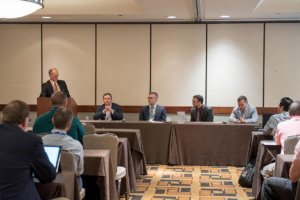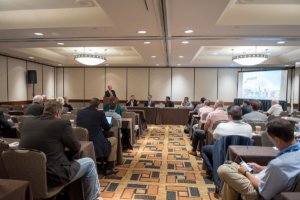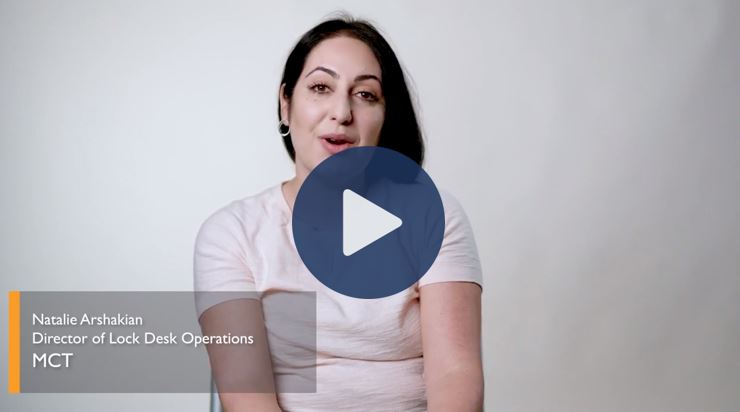The mortgage industry is slowly catching up to the age of digital loan trading & business transactions…
Over the next six months, we are expecting to see a continued trend in the adoption of digital mortgage loan trading tools. One such tool is the MCT Marketplace (MCT Marketplace®) within MCTlive!® which has recently achieved complete adoption within the investor community. This conference panel recap will help you stay ahead of the curve by exploring predictions from seasoned professionals, including MCT’s COO, Phil Rasori and creator of the MCTlive! platform.

Learn the key takeaways from the “Digital Loan Trading and the Future of Secondary Markets” panel at the Lenders One Summer Conference to prepare for the future of mortgage loan trading and make the most of the existing platforms and solutions that are available.
Explore key insights from four leaders in the industry as they discuss how they believe modern technology will influence the way we do business.
Questions Answered in this Panel Recap:
- Digital Loan Trading: Where are we now and where are we going?
- Where do you see the future of loan trading in the next 5 years?
- Why are traditional rate sheets changing as the mortgage industry becomes more digitized?
- What should lenders be doing now to prepare for digitization and change?
About the Lenders One Summer Conference
Twice a year the Lenders One community gathers at this conference to reinvigorate mortgage professionals with new ideas they can implement immediately within their businesses. This summer, there was a 30 percent increase in attendance with a new theme of “SPARK new ideas for action”.
About the Panel Discussion Topics
The coverage of this panel outlines the technological advancements of the mortgage industry that are underway. There are many adjustments and adaptations that the industry will need so that it can remain flexible with these ongoing changes to digital infrastructure.
This panel opened with Rob Chrisman announcing the primary topic of discussion: “trading techniques in the digital world”. In lieu of the conference theme to “SPARK new ideas for action,” the goal of the panel, he stated, is to give the viewers something to take away that will be directly applicable to what mortgage professionals are doing every day, and to help the audience to get a few more basis points.
The forty-plus mortgage professionals were attentive as Mr. Chrisman introduced this relevant topic. The panel progressed from individual introductions, to Q&A between the moderator and the panelists, and then concluded with audience questions.
The conference guide panel description reads:
While nearly every other financial market in the world has moved to efficient digital marketplaces, mortgage loan trading is still catching up. A lot of new efforts are underway to upgrade the security, speed, and efficiency of secondary markets.
- With all the new technologies, what does the future look like and who are the players?
- Will this finally be the spark that re-fires the non-QM market?
- Will we evolve toward an open ecosystem or a proprietary one?
Digital Loan Trading: Where are we now and where are we going?
Brandon Weiss, COO // MERSCORP Holdings, Inc.
 Mr. Weiss shared his company history to illustrate one example of how you can take analog trading assets and convert them into digital markets.
Mr. Weiss shared his company history to illustrate one example of how you can take analog trading assets and convert them into digital markets.
In 2007 MERSCORP bought the NY board of trade. At the time they said, “We love the pits and this is the way we trade, we don’t need a digital alternative.” So they compromised by saying “Okay” to running an electronic trade floor alongside the physical one. Within 6 months the physical trade floor was empty. This was the inception of MERS, a database that includes a system of record for email communication.
Jim Glennon, Manager, Trading & Account Management // Optimal Blue
In answer to the question, “Where are we at right now?” Mr. Glennon warned the audience that any lender that isn’t taking advantage of all the delivery methods available to them is likely leaving some profit on the table.
He further explained that digitizing the entire mortgage industry starts with digitizing the origination process. He imagines that the current bulk bid should soon be considered instead a “live bid”. Investors participating with “live bids” will continue to increase, but in order for this to work there needs to be standardization of the criteria, process, data, etc.
In answer to the question, “Where are we going?” he stated that there are many possibilities. The first possibility is that there will be a stock exchange level of shared adoption in the format and process for trading. Another option could be an eBay-style application that provides a format with search criteria for buyers and tools for sellers.
Kevin Karty, Vice President of Analytics Innovation // Altisource Labs
Mr. Karty asserts that digitizing of secondary markets is a foregone conclusion, and, as it is taking place in the present, what matters most is how it is executed.
He imagines that it will be either a vertical structure, like Quicken, or it will be a horizontal structure, like the NASDAQ.
In the vertical structure it will be much more consolidated and there will be process coverage from beginning to end of the pipeline. There will likely be economies of scale with a single dominant player that will shut out the smaller players over time.
In the horizontal model, it will be democratic, inclusionary, and efficient. This system will involve many small members and will be good for all the people in this room (Lenders One members). As a professional community, Mr. Karty suggested that we should be working toward the horizontal structure.
Mr. Rasori briefly stated his observation that “We’ve seen this huge shift to bid tape execution which brings the granularity of pricing.” He imagines that the end buyer wants the slow prepay. He advised the audience on many topics covered in detail in our recap of his secondary marketing opportunities for 2018 past panel appearance, which are relevant to any conversation about digitization of trading.
After each panelist answered this introductory question, Mr. Chrisman directed the next 2 questions to Kevin Karty of Altisource…
Where do you see the future of loan trading in the next 5 years?
 Mr. Karty foresees that it will be more digital and demand driven.
Mr. Karty foresees that it will be more digital and demand driven.
You won’t wait to stack up a bulk set of loans before bidding them (as in the current bulk bid process), they will instead be listed and bid as soon as they are ready. This allows buyers to sort and filter for criteria they are looking for. This type of activity should bring back the nonconforming markets with absolute transparency.
Why are traditional rate sheets changing as the mortgage industry becomes more digitized?
Mr. Karty responded that currently, bidding happens at the end of the manufacturing process. Digitization of the loan process will move the pricing and knowledge about spec payups to the point of origination, reducing the need for a traditional rate sheet. We are already starting to see this with the discontinuity between publicized rate sheets and the actual executions based on individual seller and buyer criteria.
Actionable Advice: What should lenders be doing now to prepare for digitization and change?
In answer to this question, each of the panelists took turns sharing their recommendations for top lender priorities in preparation for the digitization of whole loan trading. We hope you find these paraphrased suggestions will help your business as we continue to evolve in the digital age of the mortgage industry.
Brandon Weiss, COO // MERSCORP Holdings, Inc.
- Educate yourself. Don’t confuse the knowledge about something with the complexity of actually implementing it.
- Have a single person in charge of innovation (in both technology and process). This person should know what you need to put in place to move it forward.
Jim Glennon, Manager, Trading & Account Management // Optimal Blue
- Get up to speed with where the market is now to understand what is available and what is changing. Have good data and be prepared to make changes. Every year it moves faster.
- Have a person or committee responsible for market changes.
- Move towards a streamlined product, aside from the non-QM space.
Kevin Karty, Vice President of Analytics Innovation // Altisource Labs
- Understand your current process.The one universal thing, based on experience working with Lenders One members is that nothing is universal.
- If you’re in senior management, you need to take advantage of opportunities to increase digitization.
- If you’re in the secondary department, reach out to partners and see what mortgage hedging services or technology you can take advantage of.
- Data is #1. Clean, integrated, and thorough data is your top priority to prepare for the digitization of whole loan trading.
- With your data in order, you also need to have a robust hedging strategy in order to deliver the closed whole loan collateral on a mandatory basis. You have to hedge in order to have that closed loan and be able to sell it off in this way.
Final Audience Questions on Digital Mortgage Loan Trading
Why are many of the larger investors not on noteXchange?
The panelists first stated that the reason some investors are not on noteXchange is because they may not be participating in the whole mechanism of bulk bid tape trading by email which has evolved organically over the course of years.
Robert Wolf, VP of Business Development at Lenders One and a chief proponent of noteXchange, addressed the audience directly, “We’ve been engaging with all 20 of the top investors. There is some reticence, everyone wants to maintain their current process and have to maintain compliance and so on. But, you should expect to see a lot of momentum over the course of the next six months.”
Another audience member added, “Many of them aren’t going because we may not be pushing them there. We need to tell them, ‘I want you to be on there.’”
What loan volume is required before it makes sense to hedge?
The panelist agreed that it makes sense to hedge if you are doing homogenous fixed rate business to the tune of $7.5MM or more. Beyond volume, you also need pull-through with a consistent relationship to market changes, as well as clean data and a well-run, centralized lock desk.
Explore Other Educational Resources for Mortgage Professionals
If you enjoyed this panel recap on digital loan trading, we encourage you to read some of these related articles on the mortgage industry. To learn why MCT, the creator of MCTlive!, an award-winning secondary marketing technology, is focused on digital innovation in the mortgage industry, please contact us.
Related Articles
- MCT Exchange September 2017 Event Recap
- Trends in Secondary Execution: Big Data, Big Execution (SME Article)
- Yield & Arbitrage Theory – Servicing Insights Vol. 5 – Risk Management Part 2


